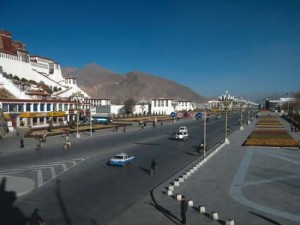
Lhasa today: the CECC report drew attention to the accelerated implementation of development initiatives in Tibet.
The 2006 Annual Report to the President and the Congress, which is available for downloading at: http://www.cecc.gov/pages/annualRpt/annualRpt06, states that the Chinese government and the Communist Party give economic development in Tibetan areas of China a higher priority than “protecting basic human rights such as the freedoms of religion, speech and assembly”.
China’s Ministry of Foreign Affairs issued a statement today (September 25) condemning the report as “groundless” and calling upon the US to “take substantive measures to eradicate the adverse impact of the report” (Xinhua, September 25 2006).
The CECC report states that in 2005, the Dalai Lama increased his efforts to explain that he does not seek Tibetan independence from China. But it also reports that “the lack of local self-government in Tibetan autonomous areas of China creates mistrust in the dialogue and demonstrates that authorities are not implementing this [Regional Ethnic Autonomy] Law”. The CECC also noted that the accelerated implementation of development initiatives under the Great Western Development program already “erode Tibetan culture and heritage”. These concerns increased when the Qinghai-Tibet railway began passenger service in July this year. The report also stated that Communist Party political campaigns “promote atheism and strengthen government efforts to discourage Tibetan aspirations to foster their unique culture and religion”.
The CECC prisoner database, also available online at www.cecc.gov, listed 103 known cases of current Tibetan political detention or imprisonment as of August 2006, a figure that is likely to be lower than the real figure of Tibetan political prisoners. The average sentence based on the data taken into account is approximately 10 years and 11 months.
Senator Chuck Hagel (R-NE), the Commission’s Chairman, said at the launch of the report last week: “It is important to acknowledge that the Chinese government has made progress in building a political system based on rule of law and respect for human rights. Nevertheless, the restrictions on fundamental human rights such as freedom of religion and freedom of the press that the Commission highlighted in its 2005 Annual Report remain in place, and in some cases, the government has strengthened their enforcement.”
The US Congress created the Congressional-Executive Commission on China in 2000 to monitor human rights and the development of the rule of law in China. The CECC called upon the President and the Congress to continue to urge the Chinese government to invite the Dalai Lama to visit China, so that he can see for himself the changes and developments in China, and so that he can seek to build trust through direct contact with the Chinese leadership.

